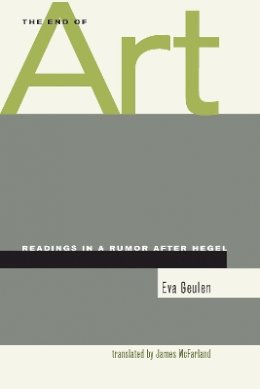9%OFF

Stock image for illustration purposes only - book cover, edition or condition may vary.
The End of Art: Readings in a Rumor after Hegel
Eva Geulen
€ 29.99
€ 27.24
FREE Delivery in Ireland
Description for The End of Art: Readings in a Rumor after Hegel
Paperback. Since "Hegel", the idea of an end of art has become a staple of aesthetic theory. In addition to providing an overview of the main thinkers of post-Idealist German aesthetics, this book explores the relationship between tradition and modernity. Translator(s): McFarland, James. Num Pages: 216 pages. BIC Classification: HPN. Category: (P) Professional & Vocational; (UP) Postgraduate, Research & Scholarly; (UU) Undergraduate. Dimension: 230 x 154 x 12. Weight in Grams: 299.
Since Hegel, the idea of an end of art has become a staple of aesthetic theory. This book analyzes its role and its rhetoric in Hegel, Nietzsche, Benjamin, Adorno, and Heidegger in order to account for the topic's enduring persistence. In addition to providing a general overview of the main thinkers of post-Idealist German aesthetics, the book explores the relationship between tradition and modernity. For despite the differences that distinguish one philosopher's end of art from another's, all authors treated here turn the end of art into an occasion to thematize and to reflect on the very thing that modernism ... Read more
Show LessProduct Details
Format
Paperback
Publication date
2006
Publisher
Stanford University Press United States
Number of pages
216
Condition
New
Number of Pages
216
Place of Publication
Palo Alto, United States
ISBN
9780804744249
SKU
V9780804744249
Shipping Time
Usually ships in 7 to 11 working days
Ref
99-50
About Eva Geulen
After having taught German for many years in the United States, most recently at New York University, Eva Geulen now teaches German at the University of Bonn, Germany. She is the author of German-language books on Adalbert Stifter (2002) and Giorgio Agamben (2005).
Reviews for The End of Art: Readings in a Rumor after Hegel
"Geulen's book succeeds in bringing new significance, renewed continuity, and robust meaning to a large portion of this endlessly productive tradition."—xNotre Dame Philosophical Reviews
